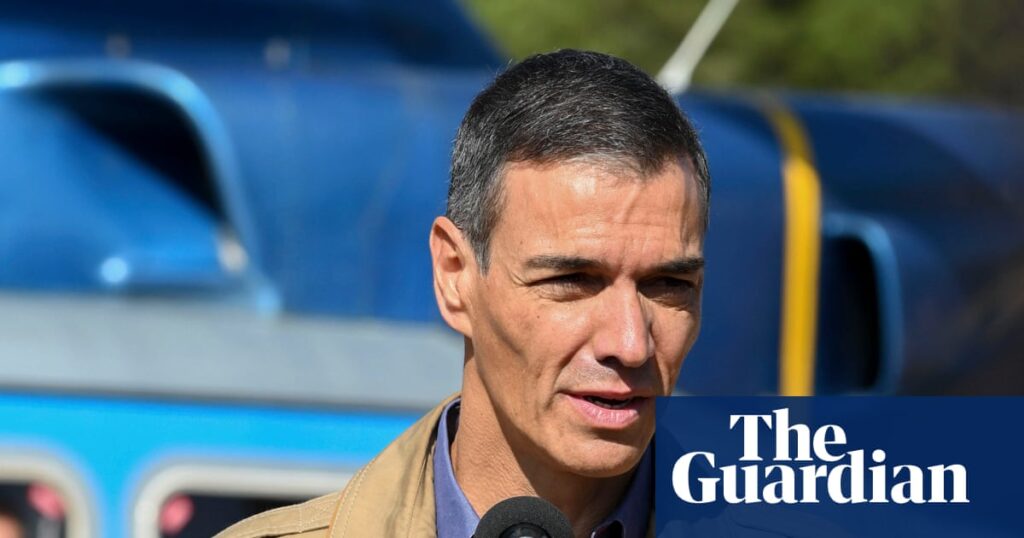Spain’s prime minister, Pedro Sánchez, has stepped up his scathing criticism of Israel’s actions in Gaza, accusing Benjamin Netanyahu’s government of “exterminating a defenceless people” by bombing hospitals and “killing innocent boys and girls with hunger”.
Speaking on Monday morning to announce a raft of measures designed to increase the pressure on Netanyahu to stop the military campaign, Sánchez said that while the Spanish government would always support Israel’s right to exist and to defend itself, it felt compelled to try to “stop a massacre”.
“Protecting your country and your society is one thing, but bombing hospitals and killing innocent boys and girls with hunger is another thing entirely,” he said.
“What Prime Minister Netanyahu presented in October 2023 as a military operation in response to the horrific terrorist attacks has ended up becoming a new wave of illegal occupations and an unjustifiable attack against the Palestinian civilian population – an attack that the UN special rapporteur and the majority of experts already describe as a genocide.”
The Spanish prime minister pointed to the numbers of dead, injured, displaced and malnourished. “That isn’t defending yourself; that’s not even attacking,” he said. “It’s exterminating a defenceless people. It’s breaking all the rules of humanitarian law.”
Sánchez also hit out once again at the international community, saying major world powers had ended up “paralysed between indifference over a conflict without end and complicity with the government of Prime Minister Netanyahu”.
Among the measures he announced “to stop the genocide in Gaza and to go after its perpetrators” was a law formalising the existing, de facto prohibition on military equipment sales or purchases with Israel, and a ban on the use of Spanish ports and airspace to transport fuel or weapons to the Israeli military. Sánchez also said those “directly involved in the genocide” would not be allowed into Spain and announced increases in his country’s humanitarian aid to Gaza.
“We know that all those measures won’t be enough to stop the invasion or the war crimes,” he said. “But we hope that they will serve to add to the pressure on Prime Minister Netanyahu and his government, to alleviate some of the suffering of the Palestinian population, and to let the Spanish people know that their country was on the right side of history when it came to one of the most infamous episodes of the 21st century.”
Sánchez’s comments and measures drew an immediate and furious response from the Israeli government, which accused his administration of deploying “wild and hateful rhetoric” and of using a “continuous anti-Israel and antisemitic attack” to distract from corruption allegations.
Israel’s foreign minister, Gideon Sa’ar, announced that two senior leftwing Spanish politicians – the labour minister and deputy prime minister, Yolanda Díaz, and the youth minister, Sira Rego – would be banned from entering Israel because of their criticisms of Israel’s conduct in Gaza.
Sa’ar said it was clear that Díaz – the founder of the Sumar alliance that is the junior partner in Sánchez’s socialist-led coalition government – was “exploiting Prime Minister Sánchez’s political weakness and dragging him, step by step, into implementing her anti-Israel and antisemitic vision”.
The Spanish foreign ministry described the Israeli government’s words as “false and slanderous”, called the entry ban for Díaz and Rego “unacceptable”, and said the country would not be “intimidated in its defence of peace, international law and human rights”. It also pointed out that Spain had granted citizenship to 72,000 descendants of the Jews who were expelled from Spain in 1492, and had immediately condemned Hamas’s “horrific attacks” of October 2023 and called for the release of all those who were taken hostage.
Sánchez’s comments came almost a week after he told the Guardian that the response to Israel’s assault on the Palestinian territory was “a failure”.
On Sunday, Israel’s supreme court ruled that the government had failed to provide Palestinian security prisoners with adequate food for basic subsistence and ordered authorities to improve their nutrition. The decision was a rare case in which the country’s highest court ruled against the government’s conduct during the nearly two-year war.
The panel of three justices ruled unanimously that the state was legally obliged to provide prisoners with enough food to ensure “a basic level of existence”. In their ruling, the justices said they had found “indications that the current food supply to prisoners does not sufficiently guarantee compliance with the legal standard”. They said they had found “real doubts” that prisoners were eating properly, and ordered the prison service to “take steps to ensure the supply of food that allows for basic subsistence conditions in accordance with the law”.

